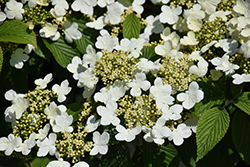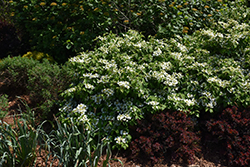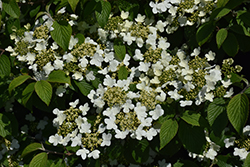make life beautiful
Plant Database
This is your garden planning resource.
Wabi Sabi® Doublefile Viburnum
Viburnum plicatum 'SMVPTFD'

Wabi Sabi® Doublefile Viburnum flowers
Wabi Sabi® Doublefile Viburnum flowers
(Photo courtesy of NetPS Plant Finder)

Wabi Sabi® Doublefile Viburnum in bloom
Wabi Sabi® Doublefile Viburnum in bloom
(Photo courtesy of NetPS Plant Finder)

Wabi Sabi® Doublefile Viburnum flowers
Wabi Sabi® Doublefile Viburnum flowers
(Photo courtesy of NetPS Plant Finder)
Height: 3 feet
Spacing: 4 feet
Sunlight:
![]()
![]()
Hardiness Zone: 5a
Other Names: V. plicatum var. tomentosum
Brand: Proven Winners
Description:
One of the highest quality garden shrubs available, with showy lacecap white flowers in spring; a dwarf, compact selection with an attractive horizontal branching habit and good fall color; a great landscape specimen, or massed along borders
Ornamental Features
Wabi Sabi® Doublefile Viburnum is covered in stunning white lacecap flowers held atop the branches in mid spring, which emerge from distinctive chartreuse flower buds. It has dark green deciduous foliage. The serrated pointy leaves turn an outstanding brick red in the fall.
Landscape Attributes
Wabi Sabi® Doublefile Viburnum is a multi-stemmed deciduous shrub with a stunning habit of growth which features almost oriental horizontally-tiered branches. Its average texture blends into the landscape, but can be balanced by one or two finer or coarser trees or shrubs for an effective composition.
This is a relatively low maintenance shrub, and should only be pruned after flowering to avoid removing any of the current season's flowers. It is a good choice for attracting birds to your yard, but is not particularly attractive to deer who tend to leave it alone in favor of tastier treats. It has no significant negative characteristics.
Wabi Sabi® Doublefile Viburnum is recommended for the following landscape applications;
- Accent
- Mass Planting
- Hedges/Screening
- General Garden Use
Planting & Growing
Wabi Sabi® Doublefile Viburnum will grow to be about 3 feet tall at maturity, with a spread of 5 feet. When grown in masses or used as a bedding plant, individual plants should be spaced approximately 4 feet apart. It has a low canopy. It grows at a medium rate, and under ideal conditions can be expected to live for 40 years or more.
This shrub does best in full sun to partial shade. It does best in average to evenly moist conditions, but will not tolerate standing water. It is not particular as to soil type or pH. It is highly tolerant of urban pollution and will even thrive in inner city environments. This is a selected variety of a species not originally from North America.
A NetPS Plant Finder tool